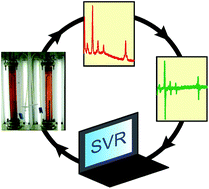
SERDS combined with signal regression analysis to monitorthe phototrophic microorganisms
As the demand for non-renewable energy sources continues to soar, alternative renewable and environmentally friendly alternatives continue to be explored. The biomass conversion by algae has emerged as promising avenue. Additionally, algae produce other compounds relevant in pharmaceutical research. A bioreactor houses these phototropic organisms, but direct measurement of these compounds within the reactor can be costly, inefficient, and require complex modeling to understand.
Researchers at University of Erlangen-Nuremberg in Germany used shifted-excitation Raman difference spectroscopy (SERDS) in a model algae system as a new way to probe these reactions. In SERDS, two spectra are acquired at slightly different wavelengths, and subtraction of the two removes the fluorescence background, a common problem in normal Raman spectroscopy. The red algae, Porphyridium purpureum produces a number of relevant compounds, such as sulfated polysaccharides, which have important anti-viral properties.
With the help of an algorithm to process the spectra, they tracked the separation of this promising pharmaceutical compound, which can be applied to other algae systems.
To know more about the study, please access the link below. This paper will be free to read for the next three weeks.
Combined shifted-excitation Raman difference spectroscopy and support vector regression for monitoring the algal production of complex polysaccharides
Kristina Noack, Björn Eskofier, Johannes Kiefer, Christina Dilk, Georg Bilow, Matthias Schirmer, Rainer Buchholz and Alfred Leipertz
Analyst, 2013, Advance Article
DOI: 10.1039/C3AN01158E










